Even amid a growing and persistent opiate epidemic, the news was staggering: At least 14 people overdosed on heroin and other opiates in a 24-hour period last weekend in Portland — and two of these people died.
This could be a watershed moment for Maine. Indeed, the surge in overdoses in Portland has shined a light on an innovative new intervention-oriented program that the city is considering. But Maine won’t make much headway against the statewide drug crisis until state officials themselves take a broader view of how best to fight it.
Gov. Paul LePage’s response to the news out of Portland struck familiar chords. The issue is state lawmakers’ “lack of commitment” to fighting substance abuse, he said, chastising legislators for funding only four of the 14 additional drug agents requested in his budget.
Regarding funds for heroin users seeking treatment in Maine — whose ranks tripled between 2010 and 2014 — the LePage administration says there’s plenty of money to go around.
In fact, “hundreds of thousands of dollars” of federal funds set aside to help uninsured Mainers get clean is going unused, the governor said last week. But substance abuse treatment providers say they didn’t even know about the program until LePage mentioned it.
Meanwhile, low-income people with substance abuse issues haven’t been getting money that could help them. Recovery centers, such as the one operated by Portland’s Mercy Hospital, have had to close because they can’t afford to keep treating people who aren’t insured.
And the LePage administration apparently has trouble communicating with addiction treatment providers — which doesn’t bode well for the success of a summit LePage is planning this month involving top law enforcement officials and drug treatment advocates.
There is good news: Portland is seeking public and private funding for a Law Enforcement Assisted Diversion pilot program. Established in Seattle, LEAD aims to connect low-level drug offenders with treatment or social services rather than sending them to jail.
After a multi-year evaluation, researchers found that the Seattle program not only reduces the number of people caught up in the criminal justice system but also results in a 60 percent drop in re-offending.
Many of the people who sell heroin in Maine aren’t drug kingpins. They’re feeding their own addiction and selling to friends, police and prosecutors told The Washington Post’s Marc Fisher for his recent feature on heroin’s toll in Maine.
These small-time dealers, like other addicts, need help, not arrest and incarceration. But their hopes for recovery will be dim as long as Maine insists on an anti-drug strategy that doesn’t acknowledge this reality.
Send questions/comments to the editors.




Comments are no longer available on this story